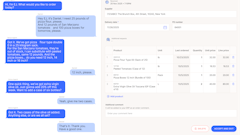
In today's distributed digital landscape, cybersecurity isn't just a concern for individual companies, but a critical responsibility spanning their entire supply chains. The interconnected nature of modern business operations has elevated the importance of safeguarding against cyber threats not only within an organization's four walls but also across its expansive network of third-party vendors and suppliers. However, recent data shows that only 15% of organizations are prepared to defend against cybersecurity threats, which can end up costing them millions of dollars.
As cyberattacks continue to grow in both sophistication and frequency, adopting a proactive approach toward cybersecurity has become paramount for business resiliency and continuity.
Proactive cybersecurity isn't merely about reacting to known threats as they arise but effectively anticipating and mitigating risks before they even materialize. Traditional reactive approaches often fall short in the face of today’s rapidly evolving cyber threats, and waiting for an attack to occur before taking action can result in substantial financial losses, reputational damage and operational disruptions. This is why proactivity is key. Businesses must embrace a forward-thinking strategy that involves continuously monitoring for signals of risks and addressing vulnerabilities head-on.
One of the most effective ways to achieve proactive cybersecurity is by leveraging advanced technologies such as artificial intelligence (AI) and automation. These technologies have revolutionized the cybersecurity landscape by empowering companies to detect, analyze and respond to threats in real time, often before they can cause significant harm. AI-powered cybersecurity solutions excel in processing vast amounts of data and identifying patterns indicative of malicious activities, enabling organizations to stay one step ahead of cyber adversaries. In fact, by leveraging AI and automation in their cybersecurity efforts, businesses save $1.76 million on average compared to those that don’t.
In the context of supply chain management, the need for a proactive approach to cybersecurity is particularly acute. Third-party suppliers and vendors represent potential entry points for bad actors aiming to infiltrate a company’s network. A successful supply chain attack can have far-reaching consequences, ranging from data breaches and intellectual property theft to operational disruptions and regulatory penalties, which is why organizations must extend their cybersecurity efforts beyond internal systems and include their entire ecosystem of suppliers to fully safeguard their operations.
Assessing the faint signals of risk within the supply chain requires a multifaceted approach that combines technological solutions with robust risk management frameworks. By harnessing the power of AI and automation, companies can enhance their ability to identify and prioritize potential cyber threats among their suppliers. AI algorithms can analyze diverse datasets, including historical breach data, supplier behavior patterns and threat intelligence feeds, to identify anomalies and indicators of compromise.
Taking it one step further, AI-driven risk assessment tools can also provide organizations with actionable insights into the security posture of their suppliers based on that analysis, enabling them to make informed decisions about risk mitigation strategies. For example, businesses can use AI to assess the cybersecurity maturity of their suppliers, identify potential vulnerabilities in their systems and proactively address security gaps before they are exploited by malicious actors.
Automation plays a crucial role in streamlining and accelerating cybersecurity processes, allowing companies to respond to threats swiftly and effectively. Automated threat detection and response systems can detect and mitigate cyber threats in real time, minimizing the impact of attacks and reducing the time and resources required for incident response. Automation can even facilitate continuous monitoring of supplier networks to ensure that any deviations from baseline behavior are promptly identified and addressed.
Not only that, but automation can enhance the efficiency of cybersecurity operations by automating routine tasks such as patch management, vulnerability scanning and access control. Automating these processes frees up cybersecurity personnel to focus on more strategic initiatives, such as threat hunting and risk analysis, thereby strengthening the organization’s overall security posture.
However, while AI and automation offer unmatched advantages in bolstering cybersecurity defenses, they are not a panacea. Effective cybersecurity requires a holistic approach that encompasses people, processes and technology. Businesses must invest in cybersecurity awareness training for employees, establish clear policies and procedures for managing supplier risk and regularly assess and update their cybersecurity strategies to adapt to evolving threats.
The imperative for organizations to adopt a proactive approach to cybersecurity in supply chain management cannot be overstated. As one of the biggest targets of cyberattacks, supply chain threats cost businesses nearly $4.4 million per incident. By leveraging AI and automation to assess the faint signals of risk and prevent cyber risks among their suppliers, companies can enhance their resilience to cyber threats and safeguard their operations and reputation. Embracing proactive cybersecurity is not just a competitive advantage, it's a business imperative in today's interconnected digital ecosystem.


















